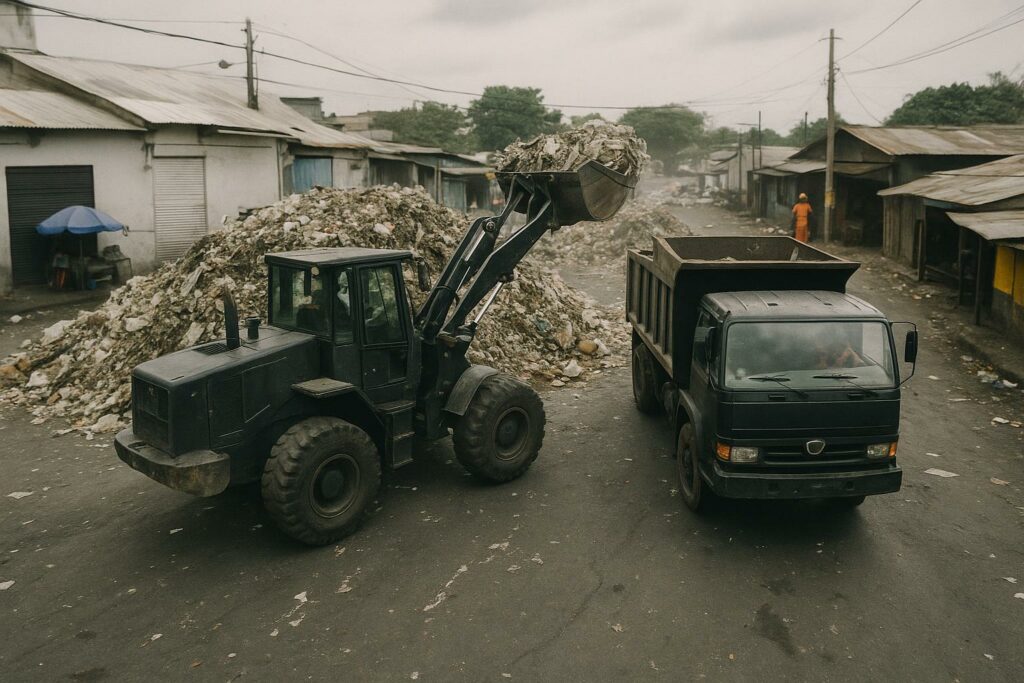Crisis In Waste Management Spurs Swift State Response
For several weeks the economic capital Pointe-Noire, like Brazzaville, had been grappling with mountains of refuse after the sudden suspension of services by the Lebanese firm Averda and the delayed arrival of its Turkish successor Albayrak. The interruption created a visible environmental emergency: makeshift dumps mushroomed beside markets, junctions and even under high-voltage lines. Residents voiced their concern to national authorities, pointing to threats of flooding, vector-borne diseases and power outages sparked by the practice of burning garbage to make space (Les Échos du Congo-Brazzaville).
Responding to the appeal and in line with President Denis Sassou Nguesso’s directive that the security forces remain close to citizens, the General Directorate for Finance and Equipment, or DGFE, commanded by Colonel-Major Michel Innocent Peya, deployed the newly created Sanitation and Environmental Protection Unit across the city. Within hours, convoys of tipper trucks, loaders and uniformed engineers converged on the heaviest accumulations of waste, signalling the start of an operation whose scale no civilian provider had been able to match.
Public Sanitation Drive Restores Markets And Roads
The first visible result emerged at the Liberty Market in Tié-Tié arrondissement. Long disfigured by odorous mounds, the commercial hub regained passable alleys and a reinstated drainage grid after several dozen tonnes of garbage were evacuated. Traders spontaneously offered bottled water to the crews, a gesture that Colonel-Major Peya interpreted as “the tangible proof that security personnel can also be guardians of public health.” Local mayor Ludmila Makosso, echoing that sentiment, thanked the Head of State, Interior Minister Raymond Zephirin Mboulou and the DGFE for “returning dignity to our neighbourhood.”
Beyond markets, the unit targeted median strips, school surrounds and taxi ranks whose obstruction had slowed urban mobility. By reopening these arteries, the mission dovetailed sanitation with traffic fluidity – a pragmatic coupling that residents said reduced daily commuting times and transport costs.
DGFE Logistics At Full Throttle
Often perceived as an administrative support service for the national police and gendarmerie, the DGFE has quietly developed one of the country’s most robust mechanical fleets. Its capacity, officials insist, lies in an integrated logistics chain able to assemble detachments of civil engineering specialists at very short notice. For the Pointe-Noire operation more than 120 agents, 30 heavy vehicles and two mobile repair workshops were mobilised, operating on a twenty-four-hour roster that allowed uninterrupted hauling to authorised landfills on the city’s outskirts.
Such versatility, Colonel-Major Peya explains, flows from the presidential ambition to modernise public services by breaking silos between defence, infrastructure and environmental departments. Decree n° 2025-25 of 21 February 2025 expressly broadened the DGFE’s mandate, empowering its sanitation unit to intervene wherever communities request support.
Health Safeguards In The Rainy Season
The timing of the clean-up, at the height of the rainy season, confers an added public-health dividend. Stagnant water mixed with organic waste is known to incubate cholera, typhoid and arboviruses. According to the district health authority, reported cases of diarrhoeal disease fell by an estimated twenty per cent in the fortnight following the initial garbage removal, though longer monitoring will be required to confirm the trend. Dr. Clarisse Koussou, an epidemiologist at the Loandjili Hospital Centre, notes that “vector control begins with environmental hygiene; the DGFE’s intervention therefore operates as frontline disease prevention.”
Equally significant is the mitigation of electrical risk. In Ngoyo, residents had resorted to burning refuse that piled beneath pylons carrying the high-tension line connecting Pointe-Noire to Brazzaville. Each improvised blaze threatened to trip the grid feeding industries and households. By clearing these spots the sanitation unit reduced the likelihood of blackouts that can cost enterprises millions of CFA francs per hour.
State-Citizen Synergy And A Replicable Model
Urban governance analysts observe that the Pointe-Noire mission is emblematic of a broader Congolese doctrine: reinforcing social cohesion by delivering concrete services. The sight of uniformed officers sweeping streets and operating loaders has, residents say, altered perceptions of the force from purely security-centric to community-oriented. The DGFE, for its part, regards such proximity as a strategic investment: cleaner neighbourhoods foster trust, deter petty crime and support the city’s aspiration to attract tourism and investment.
Officials are already considering the redeployment of the sanitation unit to other municipalities facing similar challenges. Colonel-Major Peya underlines that success relies on coordination with local councils and on sustained civic education urging households to respect collection schedules. He adds that public-private partnerships remain welcome, but that the State retains ultimate responsibility for ensuring continuity of essential services.
Towards Sustainable Urban Management
While the immediate crisis demanded an emergency response, longer-term solutions are also taking shape. The Ministry of Environment is drafting guidelines to integrate waste valorisation – including composting and energy recovery – into municipal plans, thereby reducing reliance on single operators. Meanwhile the DGFE is training a new cohort of technicians in vehicle maintenance and hazardous-waste handling to institutionalise the competencies revealed during the operation.
In the words of essayist Michel Innocent Peya, whose publications were cited by President Sassou Nguesso during the 2023 National Environment Forum, “cleanliness is a discipline that sustains development.” The Pointe-Noire clean-up illustrates how that maxim, translated into action, can tangibly improve living standards. It shows a national administration capable of agility, partnership and foresight – qualities that augur well for the Republic of Congo’s pursuit of inclusive, sustainable urbanisation.

